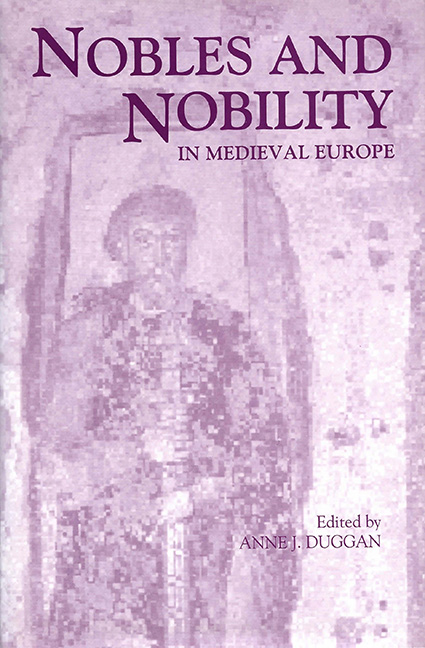 Nobles and Nobility in Medieval Europe
Nobles and Nobility in Medieval Europe Book contents
- Frontmatter
- Contents
- List of Illustrations
- Contributors
- Abbreviations
- Preface
- Dedication
- Introduction: Concepts, Origins, Transformations
- I Early Middle Ages
- II Central Middle Ages
- III Late Middle Ages
- 12 The Nobility of Medieval Portugal (XIth–XIVth Centuries)
- 13 Noblewomen, Family, and Identity in Later Medieval Europe
- 14 The Western Nobility in the Late Middle Ages: A Survey of the Historiography and some Prospects for New Research
- Index
12 - The Nobility of Medieval Portugal (XIth–XIVth Centuries)
from III - Late Middle Ages
Published online by Cambridge University Press: 25 October 2017
- Frontmatter
- Contents
- List of Illustrations
- Contributors
- Abbreviations
- Preface
- Dedication
- Introduction: Concepts, Origins, Transformations
- I Early Middle Ages
- II Central Middle Ages
- III Late Middle Ages
- 12 The Nobility of Medieval Portugal (XIth–XIVth Centuries)
- 13 Noblewomen, Family, and Identity in Later Medieval Europe
- 14 The Western Nobility in the Late Middle Ages: A Survey of the Historiography and some Prospects for New Research
- Index
Summary
Over the last twenty years Portugal has witnessed a notable revival of historical studies in general, and of the study of medieval history in particular. So far as the study of nobility is concerned, the starting point for the modern research is José Mattoso's work on the Lineage Books of the late thirteenth and fourteenth centuries. Mattoso's critical editions of the texts have provided a new lease of life for studies of the Portuguese nobility, especially when considered in combination with other types of material. By combining the material of these lineage books with information derived from the royal Enquiries of the thirteenth and fourteenth centuries, and with the patrimonial documentation of monasteries and other houses, of the royal chanceries and episcopal sees, Mattoso has laid the foundations of a prosopographical study of the nobility of the Entre-Douro e Minho from the tenth to the twelfth century, and enabled scholars to begin to perceive the structural contours of the subject. Thanks to Mattoso, it is now possible to propose some important conclusions on subjects such as the different hierarchies of nobility, marriage strategies, kinship, property, and the mental structures which formed and informed these noblemen, as well as the system of values according to which they acted.
Some of the fruits of this process have been born in the form of MA and PhD theses which have proliferated since the 1980s, notably on such subjects as the history of specific families or individuals, and the rôle and influence of such noblemen and women in and on religious houses. Court society and the institution of the Morgadio, as the apotheosis of the agnatic system in the territorial sphere, have been the subject of much work, too.
Although the source materials are vast, the best part of what we know comes from the elements in the lineage books.
- Type
- Chapter
- Information
- Nobles and Nobility in Medieval EuropeConcepts, Origins, Transformations (King's College London 1998), pp. 223 - 244Publisher: Boydell & BrewerPrint publication year: 2000


